现在完成时的定义
现在完成时
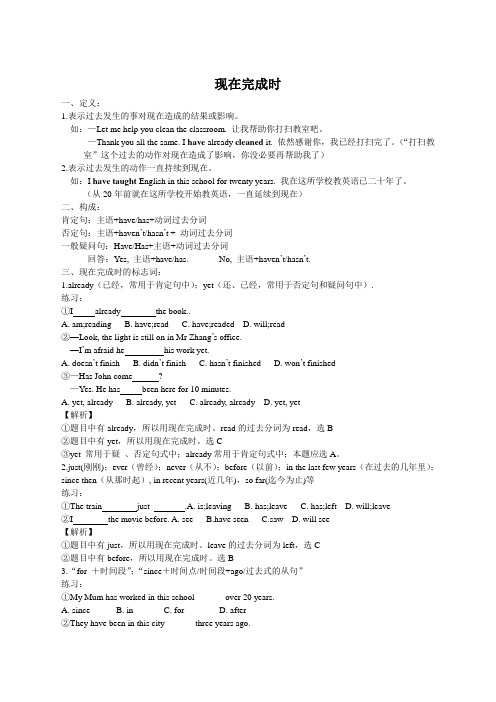
现在完成时一、定义:1.表示过去发生的事对现在造成的结果或影响。
如:—Let me help you clean the classroom. 让我帮助你打扫教室吧。
—Thank you all the same. I have already cleaned it. 依然感谢你,我已经打扫完了。
(“打扫教室”这个过去的动作对现在造成了影响,你没必要再帮助我了)2.表示过去发生的动作一直持续到现在。
如:I have taught English in this school for twenty years. 我在这所学校教英语已二十年了。
(从20年前就在这所学校开始教英语,一直延续到现在)二、构成:肯定句:主语+have/has+动词过去分词否定句:主语+haven’t/hasn’t + 动词过去分词一般疑问句:Have/Has+主语+动词过去分词回答:Yes, 主语+have/has. No, 主语+haven’t/hasn’t.三、现在完成时的标志词:1.already(已经,常用于肯定句中);yet(还、已经,常用于否定句和疑问句中).练习:①I already the book..A. am;readingB. have;readC. have;readedD. will;read②—Look, the light is still on in Mr Zhang’s office.—I’m afraid he his work yet.A. doesn’t finishB. didn’t finishC. hasn’t finishedD. won’t finished③—Has John come ?—Yes. He has been here for 10 minutes.A. yet, alreadyB. already, yetC. already, alreadyD. yet, yet【解析】①题目中有already,所以用现在完成时。
现在完成时可表示已做完的事情及已有的经验
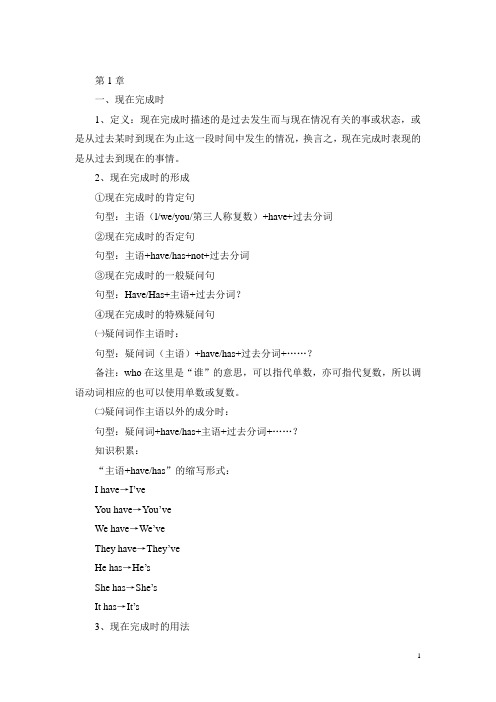
第1章一、现在完成时1、定义:现在完成时描述的是过去发生而与现在情况有关的事或状态,或是从过去某时到现在为止这一段时间中发生的情况,换言之,现在完成时表现的是从过去到现在的事情。
2、现在完成时的形成①现在完成时的肯定句句型:主语(l/we/you/第三人称复数)+have+过去分词②现在完成时的否定句句型:主语+have/has+not+过去分词③现在完成时的一般疑问句句型:Have/Has+主语+过去分词?④现在完成时的特殊疑问句㈠疑问词作主语时:句型:疑问词(主语)+have/has+过去分词+……?备注:who在这里是“谁”的意思,可以指代单数,亦可指代复数,所以调语动词相应的也可以使用单数或复数。
㈡疑问词作主语以外的成分时:句型:疑问词+have/has+主语+过去分词+……?知识积累:“主语+have/has”的缩写形式:I have→I’veY ou have→Y ou’veWe have→We’veThey have→They’veHe has→He’sShe has→She’sIt has→It’s3、现在完成时的用法“have/has+过去分词”表示现在完成时,有“继续”、“经验”、“完成”、“结果”等用法。
①继续:例:I have not seen Molly Brown since last Wednesday night.自从上个星期三晚上以来,我再也没见过莫莉·布朗。
②经验:例:Some people in Tokyo also say that they have seen aliens.在东京也有一些人声称他们曾经见过外星人。
③完成:例:Has he finished his trip to the space yet?他的太空旅行结束了吗?④结果:例:My brother has become an astronaut.我哥哥已经成为一句宇航员了。
备注:现在完成时这一时态就是动作在过去发生,但也一定要和现在有关系,否则就用过去时。
现在完成时的三个定义
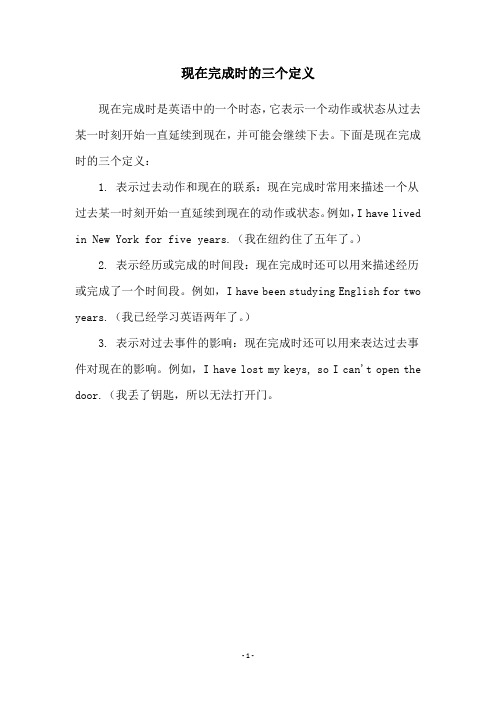
现在完成时的三个定义
现在完成时是英语中的一个时态,它表示一个动作或状态从过去某一时刻开始一直延续到现在,并可能会继续下去。
下面是现在完成时的三个定义:
1. 表示过去动作和现在的联系:现在完成时常用来描述一个从过去某一时刻开始一直延续到现在的动作或状态。
例如,I have lived in New York for five years.(我在纽约住了五年了。
)
2. 表示经历或完成的时间段:现在完成时还可以用来描述经历或完成了一个时间段。
例如,I have been studying English for two years.(我已经学习英语两年了。
)
3. 表示对过去事件的影响:现在完成时还可以用来表达过去事件对现在的影响。
例如,I have lost my keys, so I can't open the door.(我丢了钥匙,所以无法打开门。
- 1 -。
现在完成时态
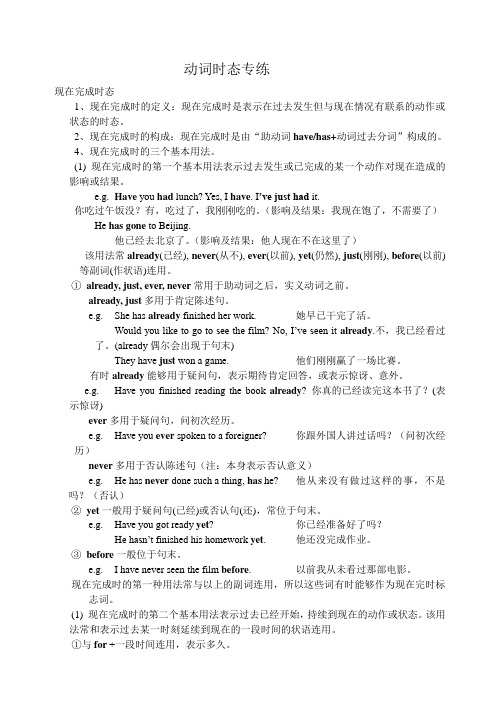
动词时态专练现在完成时态1、现在完成时的定义:现在完成时是表示在过去发生但与现在情况有联系的动作或状态的时态。
2、现在完成时的构成:现在完成时是由“助动词have/has+动词过去分词”构成的。
4、现在完成时的三个基本用法。
(1) 现在完成时的第一个基本用法表示过去发生或已完成的某一个动作对现在造成的影响或结果。
e.g. H ave you had lunch? Yes, I have. I’ve just had it.你吃过午饭没?有,吃过了,我刚刚吃的。
(影响及结果:我现在饱了,不需要了)He has gone to Beijing.他已经去北京了。
(影响及结果:他人现在不在这里了)该用法常already(已经), never(从不), ever(以前), yet(仍然), just(刚刚), before(以前)等副词(作状语)连用。
①already, just, ever, never常用于助动词之后,实义动词之前。
already, just多用于肯定陈述句。
e.g. She has already finished her work. 她早已干完了活。
Would you like to go to see the film? No, I’ve seen it already.不,我已经看过了。
(already偶尔会出现于句末)They have just won a game. 他们刚刚赢了一场比赛。
有时already能够用于疑问句,表示期待肯定回答,或表示惊讶、意外。
e.g. Have you finished reading the book already? 你真的已经读完这本书了?(表示惊讶)ever多用于疑问句,问初次经历。
e.g. Have you ever spoken to a foreigner? 你跟外国人讲过话吗?(问初次经历)never多用于否认陈述句(注:本身表示否认意义)e.g. He has never done such a thing, has he? 他从来没有做过这样的事,不是吗?(否认)②yet一般用于疑问句(已经)或否认句(还),常位于句末。
现在完成时
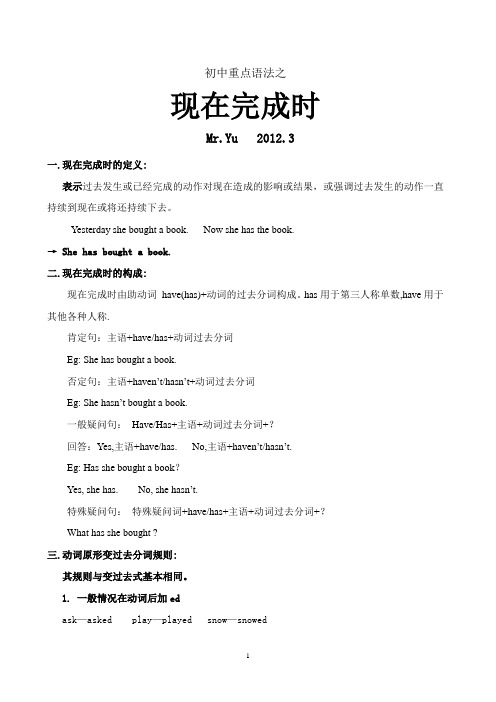
初中重点语法之现在完成时Mr.Yu 2012.3一.现在完成时的定义:表示过去发生或已经完成的动作对现在造成的影响或结果,或强调过去发生的动作一直持续到现在或将还持续下去。
Y esterday she bought a book. Now she has the book.→ She has bought a book.二.现在完成时的构成:现在完成时由助动词have(has)+动词的过去分词构成。
has用于第三人称单数,have用于其他各种人称.肯定句:主语+have/has+动词过去分词Eg: She has bought a book.否定句:主语+haven’t/hasn’t+动词过去分词Eg: She hasn’t bought a book.一般疑问句:Have/Has+主语+动词过去分词+?回答:Y es,主语+have/has. No,主语+haven’t/hasn’t.Eg: Has she bought a book?Y es, she has. No, she hasn’t.特殊疑问句:特殊疑问词+have/has+主语+动词过去分词+?What has she bought ?三.动词原形变过去分词规则:其规则与变过去式基本相同。
1. 一般情况在动词后加edask—asked play—played snow—snowed2.以不发音字母e结尾的直接加dlove—loved like—liked live—lived3.以辅音字母y结尾的变y为i再加edstudy—studied try—tried carry—carried4.以重读闭音节结尾且末尾只有一个辅音字母的,先双写这个辅音字母,再加edstop—stopped plan—planned drop—dropped5.一部分单词过去分词属于特殊变化,需要大家牢记。
不规则动词按照“动词原形,过去式,过去分词”分别分为以下几类:AAA ABA ABB ABC (具体见八下课本P120)四. 现在完成时的时间状语⑴常与不确定的时间状语连用,如:already, never, ever, just, yet, before, for the last few weeks,once,twice,sometimes,often,always,since及其从句等。
现在完成时的用法

一、现在完成时:1 定义:过去发生的事情对现在有影响或结果。
2现在完成时的构成:助动词have/has +P.P.(规则/不规则)否定not,疑问提前3标志词:already/yet/just/ever/never/before/for+时间段/since +过去的时间点(一)现在完成时的用法一1:表示过去发生或已经完成的某一动作对现在造成的影响或结果。
此时,常与时间副词already(已经/肯),yet(还、已经/否,疑句),just(刚刚、仅仅) ,ever(曾经),never(从不),before(以前)等连用。
1)I've already read this book. 我已经读过这本书了。
(“读”这一动作发生在过去,对现在造成的影响是“知道书中的内容”。
)2)I've washed my clothes already.我已经洗了衣服。
(洗衣服的动作已完成,其结果是“衣服冼干净了”。
)(二)现在完成时用法二2——持续性用法(肯定句,疑问句中谓语动词必须是延续性动词):表示过去已经开始,持续到现在的动作或状态。
此时常与“for +一段时间 或“since+过去的点时间或从句(从句用一般过去时)以及so far(到目前为止)等时间状语连用。
for + 段时间since +点时间实例:1)I've lived here since 1990.自从1990年以来我就住在这里。
= I've lived here since 13 years ago.= I've lived here for 13 years.= It is 13 years since I began to live here.2)I haven't seen him for three years .我三年没有看见他了。
= I haven't seen him since three years ago= I haven't seen him since 2000.= It is 3 years since I saw him last time.3)Mr Wang has worked in the factory since he came to the city .自从到这个城市以来,王先生一直在这家工厂工作。
现在完成时
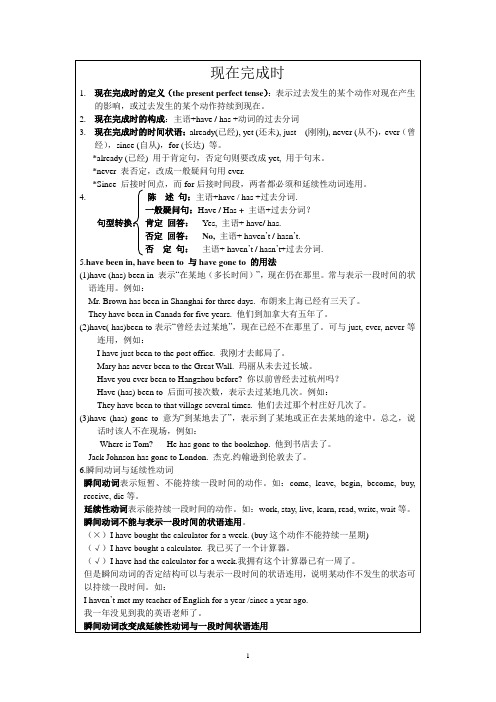
A: When will he come back , do you know?
B: I’m afraid he won’t come back recently.
A: Could you tell me the way to Hainan Island?
The filmhas been onfor five minutes.
The film has been onsince fiveminutes ago.
It isfive minutessince the film began .
It has beenfive minutessince the film began.
5.Mother _____just________(clean) the house. Please don’t come in .
6.They ____________________ (practice) this dialogue twice.
7.We ________________ (learn) English for three years/ since two years ago/ since 2000.
come/go back----be backbecome ---be
join ----be in/ be a member of/ be a----member
7.现在完成时与一般过去时的用法比较
现在完成时表示过去的动作一直延续到现在甚至会继续下去或表示过去的动作对现在造成的影响;一般过去时表示动作发生的时间在过去。现在完成时属于现在时态范围,因此,不能和表示过去的时间状语连用。如:yesterday, last night, two weeks ago等
现在完成时
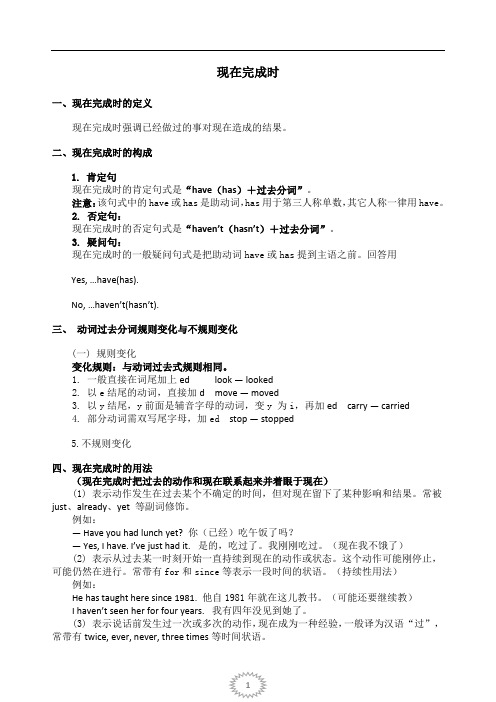
现在完成时一、现在完成时的定义现在完成时强调已经做过的事对现在造成的结果。
二、现在完成时的构成1. 肯定句现在完成时的肯定句式是“have(has)+过去分词”。
注意:该句式中的have或has是助动词,has用于第三人称单数,其它人称一律用have。
2. 否定句:现在完成时的否定句式是“haven’t(hasn’t)+过去分词”。
3. 疑问句:现在完成时的一般疑问句式是把助动词have或has提到主语之前。
回答用Yes, …have(has).No, …haven’t(hasn’t).三、动词过去分词规则变化与不规则变化(一) 规则变化变化规则:与动词过去式规则相同。
1. 一般直接在词尾加上ed look — looked2. 以e结尾的动词,直接加d move — moved3. 以y结尾,y前面是辅音字母的动词,变y 为i,再加ed carry — carried4. 部分动词需双写尾字母,加ed stop — stopped5.不规则变化四、现在完成时的用法(现在完成时把过去的动作和现在联系起来并着眼于现在)(1) 表示动作发生在过去某个不确定的时间,但对现在留下了某种影响和结果。
常被just、already、yet 等副词修饰。
例如:— Have you had lunch yet? 你(已经)吃午饭了吗?—Yes, I have. I’ve just had it. 是的,吃过了。
我刚刚吃过。
(现在我不饿了)(2) 表示从过去某一时刻开始一直持续到现在的动作或状态。
这个动作可能刚停止,可能仍然在进行。
常带有for和since等表示一段时间的状语。
(持续性用法)例如:He has taught here since 1981.他自1981年就在这儿教书。
(可能还要继续教)I haven’t seen her for four years. 我有四年没见到她了。
(3) 表示说话前发生过一次或多次的动作,现在成为一种经验,一般译为汉语“过”,常带有twice, ever, never, three times等时间状语。
中职英语语法:现在完成时

现在完成时(Present perfect)一、现在完成时定义1.过去发生并且已经完成的动作对现在造成影响或后果。
2.过去某一时间开始并一直持续到现在并且有可能还会持续的动作或状态。
二、现在完成时的结构have/has done动词的过去分词变化规则1.+ed work,plant,call2.e+d live,change,like,love,agree,save,hate,move,arrive,,skate, hope,use3.以重读闭音节结尾,末尾只有一个辅音字母的双写+ed.如:plan,stop, drop,fit(适合),prefer(更喜欢),travel4.以辅音字母+y,结尾,变y为i+edtry,study,carry,hurry,cry,worry,copy5.不规则变化三、现在完成时的标志词标志词:already yet never ever just before recently once/twice 数字+times so far by now up to nowuntil now these days in/over/during the last/past+时间段for+一段时间since+过去的某一个时间点标志词讲解already: 往往用于肯定句,放在句中或句末,在句中时位于助动词或系动词后,实义动词前。
He has already left here.yet用于否定句和疑问句,一般在句末。
My teachers haven’t had breakfast yet. Have you written to your parents yet? ever用于肯定句和疑问句中,在句中位于助动词和系动词后,实义动词前。
Have you ever visited the museum?never用于句中,助动词或系动词后,实义动词前,表示否定意义。
We have never met again since that day.just 用于句中,表示“刚刚”,与already,never等副词位置一样。
现在完成时课件

现在完成时课件一、现在完成时的定义和构成现在完成时是英语中一个非常重要的时态,它用来表示过去发生的动作或状态对现在造成的影响或结果,或者过去开始的动作一直持续到现在。
现在完成时的构成是“have/has +过去分词”。
其中,“have”用于主语是第一人称(I、we)、第二人称(you)以及复数主语(they、the boys 等);“has”用于主语是第三人称单数(he、she、it、Tom 等)。
例如:I have seen this film before(我以前看过这部电影。
)He has finished his homework(他已经完成了他的作业。
)二、现在完成时的基本用法1、表示过去发生的动作对现在造成的影响或结果这种情况下,动作发生在过去,但强调其结果或影响与现在有关。
例如:I'm very tired I have worked for hours(我很累。
我已经工作了几个小时。
)这里“工作”这个动作发生在过去,但“累”这个结果是现在的感受。
2、表示过去开始的动作一直持续到现在,并可能继续下去常和“for +时间段”“since +时间点”连用。
例如:I have lived here for ten years(我在这里住了十年了。
)She has known him since 2010(她从 2010 年就认识他了。
)3、在 this morning/week/month/year 等时间状语中,表示到目前为止已经发生的事情。
例如:I have written three letters this morning(今天上午我已经写了三封信。
)三、现在完成时的时间状语1、“for +时间段”如:for two days(两天)、for five years(五年)2、“since +时间点”如:since 1998(自从 1998 年)、since last week(自从上周)3、 already(已经),通常用于肯定句中例如:He has already left(他已经离开了。
2024年中考英语语法课件-现在完成时

现在完成时肯定句的构成
第三人称单数(he/she/it)+ has+过去分词
Tom has been absent for three days. 汤姆三天没来了。 She has gone to the town. 她进城了。
例1 We have known each other
since 2005. 我们从2005年认识的。
现在完成时
现在完成时定义
现在完成时表示过去发生或已经完成的某 一动作对现在造成的影响,还表示过去已 经开始,并且持续到现在的动作或状态。
现在完成时定义三要素
1
2
3
现在为止已 经完成或刚 刚完成的动 作
一件发生在 过去的事情 对现在产生 影响
一个动作开 始于过去并 持续到现在
现在完成时肯定句的构成
(手是干净的)
现在完成时的用法
表示从过去开始并持续到现在的动作或状态。 She has learned English for 5 years. 她学英语已经五年了。 He has lived in Beijing since he was born . 从他出生那天起就住在北京。 Has he lived in Shenzhen for 4 years? 他住在深圳四年了吗?
They haven't finished the job yet. 他们尚未完成该项工作。
She hasn't travelled on a train . 她没有坐火车旅行过。
I haven't finished my homework yet. 我还没有完成我的作业。
现在完成时的疑问句的构成
过去分词的变化(规则)
一般动词,在词尾直接加“ ed ”。 work---worked---worked
现在完成时

时间关系:现在完成时的时间点在 过去,一般将来时的时间点在将来
添加标题
添加标题
添加标题
添加标题
时态构成:现在完成时由have+动 词的过去分词构成,一般将来时由 will+动词原形构成
强调重点:现在完成时强调对现在 的影响或结果,一般将来时强调对 未来的预测和计划
现在完成时的常见句型
It is the first time that+现在完成时
感谢您的耐心观看
汇报人:
添加副标题
现在完成时
汇报人:
目录
CONTENTS
01 现在完成时的定义
02 现在完成时的构成
03 现在完成时的用法
04 现在完成时的注意 事项
05 现在完成时的常见 句型
06 现在完成时的练习 与巩固
现在完成时的定义
定义:现在完成时表示动作已经发 生并完成,对现在产生影响
动作已经发生并完成
时间状语:already, yet, just, ever, never, before 等
现在完成时的注意事项
短暂性动词不能与表示一段时间的状语连用
定义:短暂性动词也称瞬间动词或非延续性动词,表示动作瞬间完成,不能与表示一段时间的状语 连用。
常见短暂性动词举例:leave、go、come、arrive、die等。
注意事项:短暂性动词不能与表示一段时间的状语连用,如for+一段时间或since+时间点。
添加标题
添加标题
结构:have/has+过去分词
添加标题
添加标题
语态:主动语态和被动语态
对现在有影响或结果
现在完成时是一种 时态,表示动作发 生在过去,但对现 在有影响或结果
现在完成时态

三、现在完成时态的用法
3、发生次数
从过去到现在某动作重复发生的次数。
例如: He has been to Canada three times. 他去过加拿大三次。 Sam has been late for class every morning this week. 这个星期山姆每个早晨都迟到。
三、现在完成时态的用法
4、现在完成时中出现的标志词:
可在现在完成时中使用的时间/程度状语有: for, since for+时间段 eg: He has been in the army for five years. He has been in the army since 2011. since+ 过去的时间点 He has+ago been in the army since 5 years ago. 时间段 He has been in the army since he was 18. 从句(通常为一般过去时态)
三、现在完成时态的用法
1、过去经历 John, clean your teeth please.
Mum, I have already cleaned them.
动作发生在过去,结束在 过去,对现在造成了影响。
例如:
We have seen the film. 我们看过那部电影了。 (意为已知道电影内容或者不需要再次观看了) Lily has turned off the light. 丽丽(已经)把灯关上了。 (意为现在房间是黑的了)
三、现在完成时态的用法
4、现在完成时中出现的标志词:
可在现在完成时中使用的时间/程度状语有: already, yet already用于肯定句中,用于句中。 eg: We've already had the exam. yet用于否定句或疑问句之中,用于句末。 eg: Have you got it yet? I haven't had my car repaired yet.
现在完成时
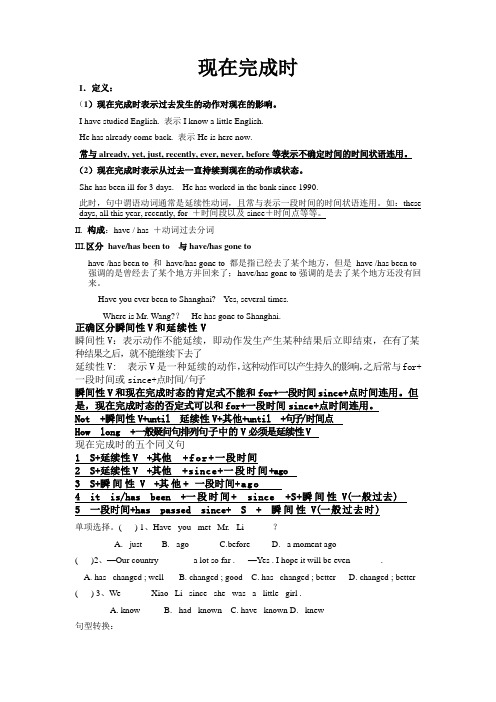
现在完成时I.定义:(1)现在完成时表示过去发生的动作对现在的影响。
I have studied English. 表示I know a little English.He has already come back. 表示He is here now.常与already, yet, just, recently, ever, never, before等表示不确定时间的时间状语连用。
(2)现在完成时表示从过去一直持续到现在的动作或状态。
She has been ill for 3 days. He has worked in the bank since 1990.此时,句中谓语动词通常是延续性动词,且常与表示一段时间的时间状语连用。
如:these days, all this year, recently, for +时间段以及since+时间点等等。
II. 构成:have / has +动词过去分词III.区分have/has been to 与have/has gone tohave /has been to 和have/has gone to 都是指已经去了某个地方,但是have /has been to 强调的是曾经去了某个地方并回来了;have/has gone to强调的是去了某个地方还没有回来。
--Have you ever been to Shanghai? --Yes, several times.单项选择。
( ) 1、Have you met Mr. Li ______?A. justB. agoC.beforeD. a moment ago( )2、—Our country ______ a lot so far . —Yes . I hope it will be even ______ .A. has changed ; wellB. changed ; goodC. has changed ; betterD. changed ; better ( ) 3、We ______ Xiao Li since she was a little girl .A. knowB. had knownC. have knownD. knew句型转换:1、They have been here since 2000. (对划线部分提问) have they been here?2、The old man _________ last year. He for a year. (die)(动词填空)3、Miss Gao left an hour ago. (同义句)Miss Gao________ ______ ______ ______ an hour ago.4、Her mother has been a Party member for three years .(同义句)Her mother _______ the Party three years ________ .()1.—Have you ever _________to a water park? —No,I haven’t. A. gone B. been C. visited ()2. —I enjoy ice skating.—_______________.A. I do so. B. So I do. C. So do I. ()3. —I have__________been to U.S.A.—Neither has Jim.A. never B. ever C. already ()4.My teacher is_______years old.A. 30 more than B. more than 30 C. more 30 than ()5. You can rent a bike if you want to get some _____.A.exercise B. exercises C. exrecise ()6.I’ve never ____________other countries.A. traveled B. traveled to C. travelled()7.All I ever wanted to do ____________become a teacher. A. is B. is to C.is want1. I __________(finish)today’s homework already. What about you?2. He ____________ just ____________(decide) to join the swimming club.3. _______you ____________(see) Jack recently? ——No , I haven’ t.4. How long ____________ you ____________(be) in class today?5. How many English words ____________ they ____________(learn)?6. He ___________ ever ___________ (be) to the History Museum several times.7. — _____________ you ever ___________ (be) to the zoo?—Yes. I ____ (go) there last summer. I __ (see) many kinds of animals there.8. —Where is Mr. Wang?—He _________ (go) to the library. He wants to borrow some library books.( ) 1. ----_____ you ever _____ to an aquarium? ----Yes, we had a good time there.A. Have, goneB. Had, beenC. Have, been( ) 2. I _____ my grandpa last Sunday.A. have visited B. visited C. was visiting ( ) 3. She _____ Shanghai for a month.A. has come to B. came to C. has been in ( ) 4. Lu Xun _____ more than fifty years ago.A. died B. has died C. has been dead ( ) 5. Fanny _____ TV at this time last Saturday.A. has watched B. was watching C. watched ( ) 6. ---- Have you ____ been to our town before?---- No, it's the first time I ___ here.A. even, have comeB. ever, comeC. ever, have come所给词的适当形式填空1. Have you ever _______________(study) with more than three friends?2. Has Tom ever ______________(travel) to China?3. Have you ever_________(say) something you didn’t want to say?4. I have never _____________(argue) with my parents.5. I ____________(go) to the space museum last year.6. Harvey____________(have) a great time at the Water World.选择填空(have / has been 或have/has gone)1. A:I saw you in Harry ’s Restaurant last night.B:No, it wasn’t me. I _______ never __________ there.2. A:Sal ly and Tim are on holiday, aren’t they? Where ____they _______?B:To Florida, again.A:How many times _______they ______ there? B:This is their third visit.3. A:Can I have an apple, please?B:We haven’t got any. I_____ not ____ to the shops today.4. A:W here’s Tony? B:He’s got a headache so he _________to bed.5. A:(on the phone)Can I speak to Mary, please?B:She’s out, I’m afraid. She ________ to the cinema this evening.( )1. His father the Party since 1978 A.joined B.has joined C.was in D.has been in ( )2.- How long have you here ?-About two months. A.been eD.arrived ( )3.Hurry up ! The play for ten minutesA.has begunB.had begunC.has been onD.began( )4.It ten years since he left the army.A.is B.has C.will D.was( )5. My parents Shandong for ten years.A.have been inB.have been toC.have gone toD.have been ( )6.His uncle for more than 9 years.A.has come hereB.has started to workC.hav lived thereD.has left the university ( )1. _____ you ever _____ to an aquarium? Yes, we had a good time there.A. Have, goneB. Had, beenC. Have, been( ) 2. I _____ my grandpa last Sunday.A. have visitedB. visitedC. was visiting( ) 3. She _____ Shanghai for a month.A. has come toB. came toC. has been in( ) 4. Mr. Hu died last year. He ____for several months alredy.A. has been dyingB. has diedC. has been deadD. died( ) 5. Fanny _____ TV at this time last Saturday.A. has watchedB. was watchingC. watched( ) 6 Have you ____ been to our town before? No, it's the first time I ___ here.A. even, have comeB. ever, comeC. ever, have come( )7. May ______ the book for two weeks.A. borrowedB. lentC. keptD. bought。
现在完成时
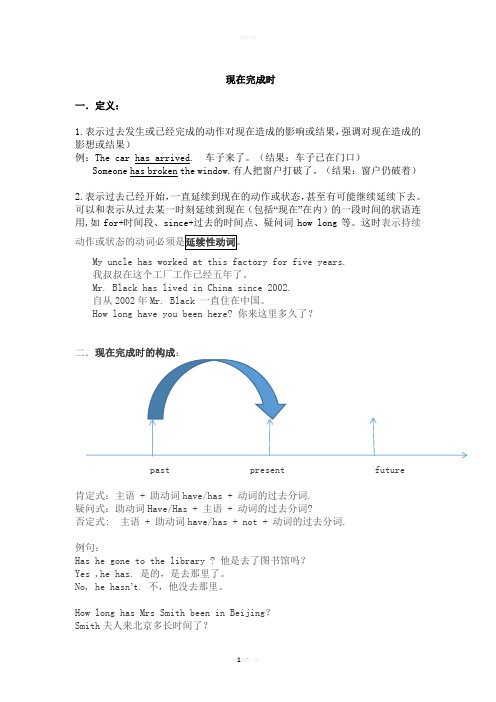
现在完成时一.定义:1.表示过去发生或已经完成的动作对现在造成的影响或结果,强调对现在造成的影想或结果)例:The car has arrived. 车子来了。
(结果:车子已在门口)Someone has broken the window.有人把窗户打破了。
(结果:窗户仍破着)2.表示过去已经开始,一直延续到现在的动作或状态,甚至有可能继续延续下去。
可以和表示从过去某一时刻延续到现在(包括“现在”在内)的一段时间的状语连用,如for+时间段、since+过去的时间点、疑问词how long等。
这时表示持续My uncle has worked at this factory for five years.我叔叔在这个工厂工作已经五年了。
Mr. Black has lived in China since 2002.自从2002年Mr. Black 一直住在中国。
How long have you been here? 你来这里多久了?二.现在完成时的构成:past present future肯定式:主语 + 助动词have/has + 动词的过去分词.疑问式:助动词Have/Has + 主语 + 动词的过去分词?否定式: 主语 + 助动词have/has + not + 动词的过去分词.例句:Has he gone to the library ? 他是去了图书馆吗?Yes ,he has. 是的,是去那里了。
No, he hasn’t. 不,他没去那里。
How long has Mrs Smith been in Beijing?Smith夫人来北京多长时间了?三.用法:1.表示过去发生的某一动作对现在造成的影响或结果。
-- It’s so dark.--Someone has turned off the light.(有人刚把灯关了,对现在造成的结果是:现在很黑)-- Are you free?--I have finished my homework. I am free.(我已经完成了家庭作业,对现在造成的结果是很有空)2.表示过去已经开始, 持续到现在的动作或状态.I have learnt English for more than ten years.我已经学了10多年的英语。
现在完成时
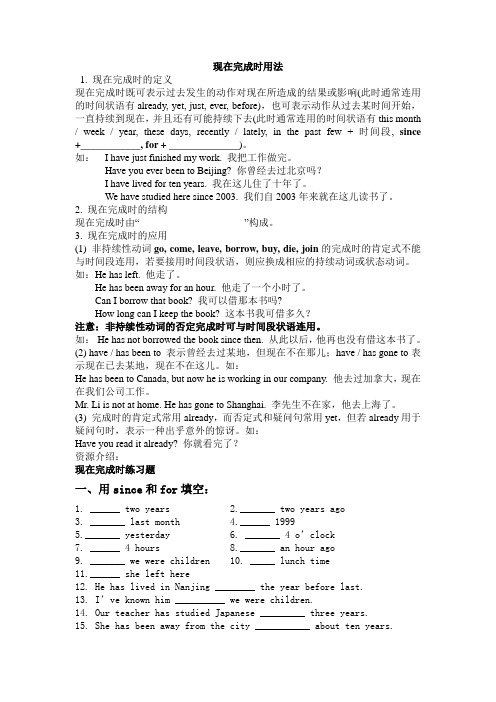
现在完成时用法1. 现在完成时的定义现在完成时既可表示过去发生的动作对现在所造成的结果或影响(此时通常连用的时间状语有already, yet, just, ever, before),也可表示动作从过去某时间开始,一直持续到现在,并且还有可能持续下去(此时通常连用的时间状语有this month / week / year, these days, recently / lately, in the past few + 时间段,since +____________, for + ______________)。
如:I have just finished my work. 我把工作做完。
Have you ever been to Beijing? 你曾经去过北京吗?I have lived for ten years. 我在这儿住了十年了。
We have studied here since 2003. 我们自2003年来就在这儿读书了。
2. 现在完成时的结构现在完成时由“_____________________”构成。
3. 现在完成时的应用(1) 非持续性动词go, come, leave, borrow, buy, die, join的完成时的肯定式不能与时间段连用,若要接用时间段状语,则应换成相应的持续动词或状态动词。
如:He has left. 他走了。
He has been away for an hour. 他走了一个小时了。
Can I borrow that book? 我可以借那本书吗?How long can I keep the book? 这本书我可借多久?注意:非持续性动词的否定完成时可与时间段状语连用。
如:He has not borrowed the book since then. 从此以后,他再也没有借这本书了。
(2) have / has been to 表示曾经去过某地,但现在不在那儿;have / has gone to表示现在已去某地,现在不在这儿。
英语语法——现在完成时

现在完成时(1.)定义:现在完成时用来表示现在之前已发生过或完成的动作或状态,但其结果却和现在有联系,也就是说,动作或状态发生在过去但它的影响现在还存在. I have lost my wallet.(含义是:现在我没有钱花了.) Jane has laid the table.(含义是:简已在吃饭.)( 2.)定义2:现在完成时可以用来表示发生在过去某一时刻的,持续到现在的情况,常与for,since 连用. Mary has been ill for three days. I have lived here since 1998.注意:1. 现在完成时不能单独与准确时间连用,如yesterday(morning 、afternoon),last(morning、afternoon)等,除非与for,since 连用.2. 现在完成时往往同表示不确定的过去时间状语连用, 如already, yet, just, before, recently,still, lately 等:3. 现在完成时常常与表示频度的时间状语连用,如often, sometimes, ever, never, twice, on several occasion 等: Have you ever been to Beijing I have never heard Bunny say anything against her.4. 现在完成时还往往可以同包括现在时间在内的时间状语连用,如now, up to these few days/weeks/months/years, this morning/week/month/year, now, just, today, up to present, so far 等: Peter has written six papers so far. Man has now learned to release energy from the nucleus of the atom.(2)现在完成时常见两种句型:①for 短语②It is+一段时间+since 从句3.一段时间+has passed+since 从句4.主语+have / has been+since 短语例如:He has been in the League for three years. 或It is three years since he joined the League. 他入团已三年了(2)现在完成时强调过去发生的动作对现在的影响和结果,而一般过去时与现在没有联系,只是说明某个动作发生的时间是在过去。
现在完成时
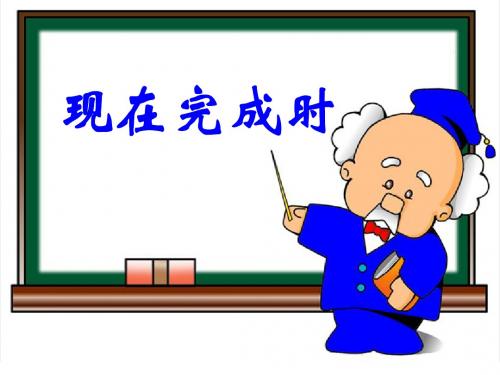
exercise
C 1.She isn’t here now because she ____ the z A.has been to B. have gone to C. has gone 2.The GreensA _____ Guilin twice. D.have gon A.have been to B. have been in C. has been C 3.Lily has made lots of friends since she ___ A. come B. has been C. came D. coming 4.My parents ______ in Beijing since 1995. B A. are living B. have lived C. lived D. will live 5.His grandmaD ______ for 2 years. A.Was died B. has died C. was dead D. has been dead
• 第3、通常与表示包括现在在内的时间副词 • just(刚刚), already(已经), • before, yet(一般疑问:已经;否定句: 还) • never, ever ,recently等状语连用
already ---------用于肯定句
yet 还;Leabharlann 经 用于否定句,疑问句She has not seen this film yet . She has already seen this film. I have already combed my hair. Have you combed your hair yet? He hasalready watched a video. He has not watched a video yet.
现在完成时

现在完成时1.定义:表示过去发生或已经完成的动作对现在造成的影响或结果2.时间标志词:常与时间副词already(已经),yet(还、已经),just(刚刚、仅仅) ,ever(曾经),never(从不),before(以前)等连用3.结构:主语+ have/ has +过去分词+其他肯定句:主语+ have/ has +过去分词+其他I have already had my lunch. 否定句:在助动词have /has后面加not I haven’t had my lunch yet.have not,has not的缩略式分别为haven’t ,hasn’t。
另外,肯定句中有some,already时,改为否定句时要分别改成any,yet(一般置于句末)。
一般疑问句:把have或has放到句首,句末打问号,Have you had your lunch yet?肯定句中有some ,already的改为any ,yet Yes ,I have /No ,I haven’t.特殊疑问句:疑问词+一般疑问句I have had my lunch.Have you had your lunch ?What have you done (do的过去分词)?4.动词变过去分词:A.直接加-ed。
如:play-playedB.以字母e结尾的直接加d 。
如:name-namedC.以辅音字母加y结尾的,变y为i加ed。
如:carry-carriedD.重读闭音节且末尾只有一个辅音字母,双写这个辅音字母再加-ed。
如:stop-stopped习题专项训练:一。
- 1、下载文档前请自行甄别文档内容的完整性,平台不提供额外的编辑、内容补充、找答案等附加服务。
- 2、"仅部分预览"的文档,不可在线预览部分如存在完整性等问题,可反馈申请退款(可完整预览的文档不适用该条件!)。
- 3、如文档侵犯您的权益,请联系客服反馈,我们会尽快为您处理(人工客服工作时间:9:00-18:30)。
现在完成时的定义:
1. 表示过去发生或已经完成的某一动作对现在造成的影响或结果
e.g. –Have you had your lunch yet?
–Yes, I have. I’ve just had it. (现在我不饿了。
)
2. 表示动作或状态从过去某一时刻开始,一直延续到现在,而且可能还要继续下去。
e.g. I haven’t seen her these days.
I’ve known Bob for three years.
I’ve been at this school for o ver two years.
现在完成时的构成:
主语+have/has +动词的过去分词.
否定:have, has后面加not
一般疑问句:have, has提到主语前
用法要点:
1.现在完成时往往同表示不确定的过去时间状语连用
already(肯定句中),yet(否定,疑问,句末),just, before, recently, still, lately, never等:
现在完成时常用短语up to now /till now, so far
Up to/till now he's read many story books. 至今他已读过好多故事书。
I've been to New York three times so far. 至今我已到纽约去过三次。
has gone (to),has been (to),has been (in) 的区别。
has gone to:表示某人已去了某地,而没有回来(去了没回)(不可与for+一段时间连用)
has been to :表示去过某地(去过已回来)(不可与for+一段时间连用)
has been in/at(in表示相对大一些的地点;at表示相对小一些的地点):表示一直呆在某地,常与时间段搭配since+时间点=for+时间段since+一般过去时态的时间状语从句=since+时间点+ago
动词过去式和过去分词的变化相同
规则变化:
1. 一般在动词词尾直接ed. 如:pick → picked → picked; wish → wished → wished; stay → stayed → stayed A-A-A: let → let → let; put → put → put; read→ read → read, cut→cut→cut
A-B-B: lend → lent → lent; build → built → built; send → sent → sent
buy → bought → bought; bring → brought → brought; catch → caught → caught;
teach → taught → taught
A-B-C: choose→chose→chosen do→did→done
see→saw→seen drink→drank→drunk
go→went→gone take→took→taken
A-B-A: run→ran→run come→came→come。
